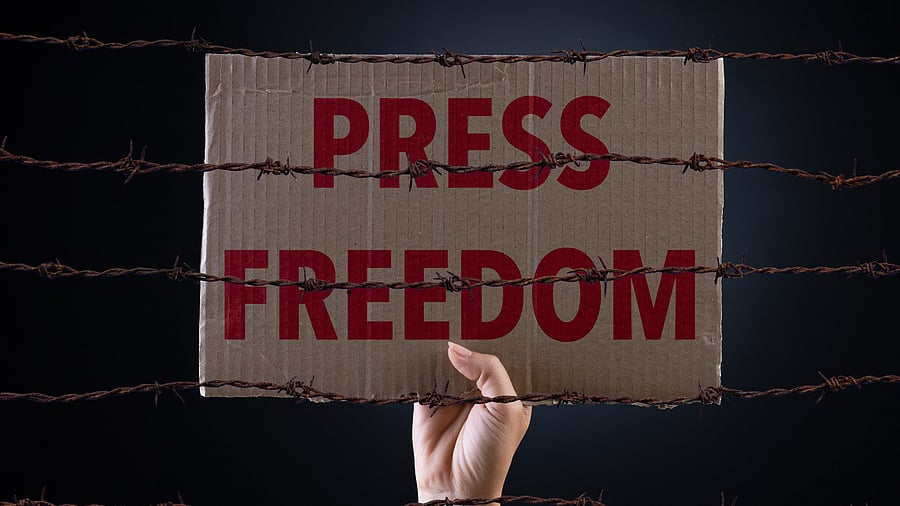
Representative image indicating assault on press freedom
Credit: iStock Photo
Chennai: Press freedom and privacy were allies and the fear of surveillance is an assault on the press, democracy’s fourth pillar, the Madras High Court has ruled while finding fault with an all-women Special Investigation Team (SIT) for seizing mobile phone of journalists in the Anna University sexual assault case.
Justice G K Ilanthiraiyan also concluded that forcing journalists to provide access to their personal and private data and asking them to reveal private and confidential information, is “nothing but assaulting the press and oppressing them with the fear of surveillance.”
The judgement came in a case filed by four journalists who challenged the SIT’s action of confiscating their smartphones and asking intriguing questions about their personal and professional lives, including asking to disclose their sources in connection with the “leak” of the FIR.
“Further the source of information received or reported by that news agency falls under the purview of privileged communication in accordance with the Section 15(2) of the Press Council Act. Therefore, seizure of devices would result in disclosure of the source of information,” the judge wrote his judgement.
The SIT probing the sexual assault of a second year student at Anna University on the instructions of the High Court asked journalists to answer over 50 questions, most of them unrelated to the case. They were asked to reveal details of their foreign trips, assets owned by them and their family members, and other personal details.
After going through the questionnaire, a copy of which was produced before him, the judge said most of the questions were found in relation to the private information about the petitioners and that it was a clear violation of the right to privacy guaranteed under the Constitution. “Privacy is an essential part of human dignity and personal liberty, which protects an individual's freedom to make choices and control their life,” the judge added.
The judge said the investigation officer didn’t have to seize the cell phone from the petitioners which was a clear violation of Section 15(2) of the Press Council Act, while accepting the petitioners’ argument that they never uploaded the FIR of the case on social media.
Justice Ilanthiraiyan also faulted the SIT for not inquiring the author of the FIR and the persons who had uploaded the document in the official portal, CCTNS. “…without even examining the person who had uploaded the FIR in the official website and the person who authored the FIR, they enquired the petitioners. Further without any authorization of the author of the FIR, the FIR could not have been uploaded in the official website,” he added.
Contending that uploading of the FIR relating to the sexual offences is a clear violation of the order passed by the Supreme Court, the court observed that the SIT, though has the power to summon the petitioners for investigation purposes, should not be harassed in any manner.
The judge directed the SIT to complete the enquiry with the petitioners on or before February 10, return the petitioners' mobile phone, and devices which were seized from them during enquiry, and not to enquire about the personal details of the petitioners’ friends, and relatives. The minutes of the enquiry shall be recorded in the general diary and case diary and the SIT shall not ask any irrelevant questions in the guise of enquiry, the judge added.